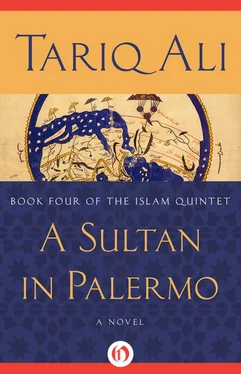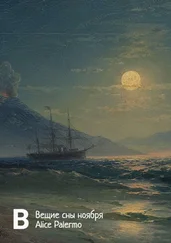The book was finished two months before the new children were due and Idrisi became irritable. It was Balkis who suggested he and Uthman go and see Walid in Venice. The mere suggestion sent Uthman scurrying to his tree and he stayed there till Balkis and Elinore arrived to comfort him and apologise for the suggestion. ‘Please don’t get rid of me,’ was all he said to them. Balkis was mortified.
Unlike his son, Idrisi was ready to travel again. He missed the sea, but he also knew that if he did not go to Walid now it might soon be too late. From there he would go to Alexandria and Cairo and renew long-forgotten friendships. He, who had been lost in his work for so long, now felt the need to be in a city where Believers ruled, but not any city. The barbarians are bad enough, he thought, but we have our own barbarians who burn books by our greatest philosophers and punish poets. If the real barbarians and ours ever got together, Allah alone would not be sufficient to help us.
His mind was made up. He asked Uthman to read the whole manuscript carefully and iron out the inconsistencies. When he came back he would prepare the final draft.
‘When will that be, Abu?’
‘A few months at most. Look after Afdal for me.’
This was the most painful farewell for they had become strongly attached to each other. After embracing his father, Uthman retreated to the tree once again. He did not like people leaving the estate.
Idrisi wished Elinore and Simeon well and asked if they had thought of a name in case it was a boy.
‘Thawdor,’ replied Elinore.
‘Original,’ replied her father.
Balkis had sworn to herself she would not weep and her eyes remained dry.
‘If our child is a girl and Elinore has a boy, I will call our daughter Mayya. Agreed?’
‘Agreed. And if it is a boy?’
‘Nuwas! Agreed.’
‘Agreed. And what if you both have girls?’
‘I hadn’t thought of that possibility.’
‘Let there be two Mayyas.’
‘I will. Muhammad I need to know the truth. Could you put a price on our love?’
‘How could I? It’s priceless.’
‘Then make sure you return to me. I don’t want to think of you as a beggar in a foreign land. This island is your home regardless of everything. And the elixir that cures your cough is not of the same quality elsewhere.’
He kissed her eyes and then her lips.
Two days sailing and Siracusa already seemed far away. Idrisi did not know it, but he had passed a merchant ship carrying Walid to Siqilliya. He wondered if they could ever take the island back from the Franks and get rid of the Lombards. But if we did succeed, what would we do this time that was different from the last? Would we be able to work together? Give the people something that they would die for without too much urging? The Trusted One had useful ideas, but the big problem was to break from tribal modes of thought and rise to the level of the culture we have created. But these are all golden dreams. How can one deal with hundreds of thousands of people who ignore their own interests and head proudly towards one disaster, then another?
Perhaps he would not visit Alexandria this time. He would go to the city of the caliphs and mingle with the poets and philosophers and search for new books in the House of Wisdom. He would go to Baghdad, the city that will always be ours. The city that will never fall. The city that will never fall.
IDRISI MET WALID ON his return to Siqilliya and lived on his estate till his death eleven years after that of Rujari. His Medical Formulary was published in Baghdad, but did not contain the remedy for coughs. Uthman and Walid never married. Balkis’s son Nuwas became a wandering poet, leaving Siracusa when he was eighteen and moving from one city to another in al-Andalus. None of his poems have survived. Elinore’s daughter, Mayya, and her three brothers and their children continued to live on the estate where a larger church had to be constructed to accommodate the new flock. The Trusted One, after teaching philosophy and history to Khalid and his children, died peacefully at the age of eighty-four. The village he helped to re-found still exists and venerates his memory — though he is now regarded as a Christian saint.
In the hundred years that elapsed after Idrisi’s death, members of his family fought in every single rebellion. While the Franks were fighting each other for the throne in Palermo, armed bands under the command of Khalid ibn Umar and Afdal ibn Muhammad had liberated large parts of western Siqilliya. The Franks sent expeditions to crush them, but were content to keep them confined to their strongholds. An uprising in Palermo had shaken Frankish self-confidence and severe restrictions had been imposed. The Friday khutba was forbidden and attendance of any mehfil was punished with death.
Khalid died at the age of sixty as church bells were ringing to mark twelve hundred years of the Nazarene religion. His son Muhammad joined Afdal and for many years they harassed and destroyed many legions despatched by Palermo to crush them.
It was Rujari’s grandson, Frederick, who finally destroyed the last remaining strongholds of the rebellion in Siqilliya. His love of Arabic culture and his own palaces and harems had led some Believers to hope that the golden age might return. But they had forgotten that young Frederick was also the grandson of Barbarossa. The two strains in him often led to compromises. He did not wish to massacre the Muslims, but simply to remove them and thus purify the island. In the twelve hundred and twenty-fourth year of the Christian era, those who refused to convert were asked to pack their belongings and were taken to large enclosures in all the key ports of the island. For twelve months, over fifty thousand Siqilliyans who refused to surrender spiritually were transported in ships to the mainland. Among them were Idrisi’s grandchildren, Muhammad ibn Afdal, Muhammad ibn Khalid and their families.
In the region of Apulia, near an ancient Roman town where once Caesar had battled Pompey, there was a tiny village, Lucera, virtually uninhabited. This is where they were transported. Within two years, Lucera had become one of the most prosperous towns of the south. The land surrounding the settlement was cultivated after years of lying fallow, workshops sprang up to produce arms and clothes and skilled craftsmen produced wooden inlays and ceramics that were no longer being made in Noto and Siracusa. Frederick built a castle for himself with its own harem. The settlers built a beautiful mosque with a large library, not far from the castle. The Pope excommunicated Frederick for permitting the construction of buildings where ‘cursed Muhammad is adored’. It is said that when the excommunication was read to him in his palace at Lucera, he was in his cups, surrounded by concubines and listening to music. Extremely annoyed by what the Pope had done, he responded in the time-honoured tradition of the Siqilliyan side of his family. He farted.
Within the settlement, three young men began to organise secret mehfils. They would meet each Friday night and discuss the future of their people. Slowly more and more people, young and old, men and women, began to listen. Ibn Afdal would tell them that Lucera appeared peaceful and they were not persecuted, even though too many young men had been killed fighting Frederick’s war against other Nazarenes.
‘Having forced us to leave Siqilliya, he can be kind, but this same King who permitted us to build the Great Mosque here is destroying all our mosques in Palermo and the rest of the island. We have been discussing our future for many months now. I would suggest that we prepare to leave this place. It will not be safe after Frederick dies. I am not suggesting that we leave at once. They would kill us before we travelled too far. But each month one family should leave.’
Читать дальше












